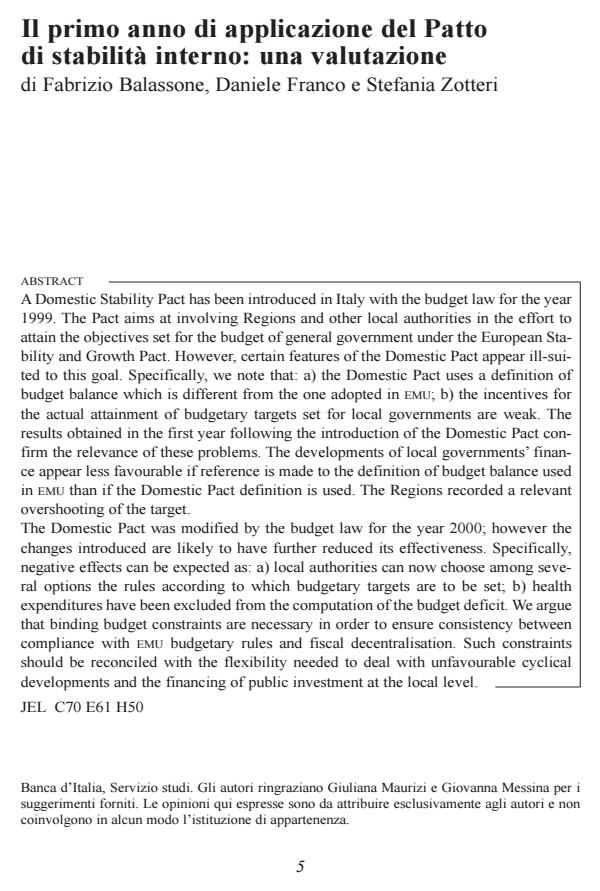Il primo anno di applicazione del Patto di stabilità interno: una valutazione
Journal title ECONOMIA PUBBLICA
Author/s Fabrizio Balassone, Daniele Franco, Stefania Zotteri
Publishing Year 2001 Issue 2001/2 Language Italian
Pages 22 P. File size 126 KB
DOI
DOI is like a bar code for intellectual property: to have more infomation
click here
Below, you can see the article first page
If you want to buy this article in PDF format, you can do it, following the instructions to buy download credits

FrancoAngeli is member of Publishers International Linking Association, Inc (PILA), a not-for-profit association which run the CrossRef service enabling links to and from online scholarly content.
A Domestic Stability Pact has been introduced in Italy with the budget law for the year 1999. The Pact aims at involving Regions and other local authorities in the effort to attain the objectives set for the budget of general government under the European Stability and Growth Pact. However, certain features of the Domestic Pact appear ill-suited to this goal. Specifically, we note that: a) the Domestic Pact uses a definition of budget balance which is different from the one adopted in EMU; b) the incentives for the actual attainment of budgetary targets set for local governments are weak. The results obtained in the first year following the introduction of the Domestic Pact confirm the relevance of these problems. The developments of local governments’ finance appear less favourable if reference is made to the definition of budget balance used in EMU than if the Domestic Pact definition is used. The Regions recorded a relevant overshooting of the target. The Domestic Pact was modified by the budget law for the year 2000; however the changes introduced are likely to have further reduced its effectiveness. Specifically, negative effects can be expected as: a) local authorities can now choose among several options the rules according to which budgetary targets are to be set; b) health expenditures have been excluded from the computation of the budget deficit. We argue that binding budget constraints are necessary in order to ensure consistency between compliance with EMU budgetary rules and fiscal decentralisation. Such constraints should be reconciled with the flexibility needed to deal with unfavourable cyclical developments and the financing of public investment at the local level.
Fabrizio Balassone, Daniele Franco, Stefania Zotteri, Il primo anno di applicazione del Patto di stabilità interno: una valutazione in "ECONOMIA PUBBLICA " 2/2001, pp , DOI: